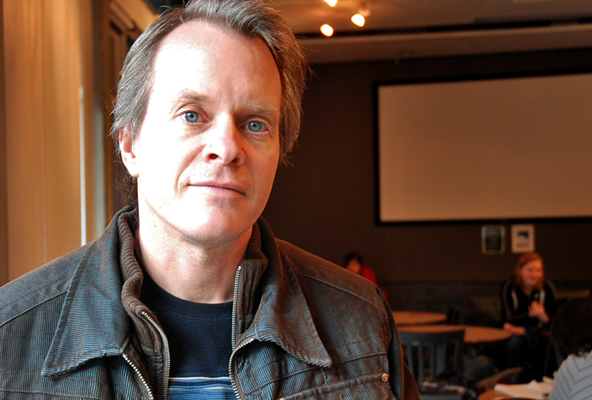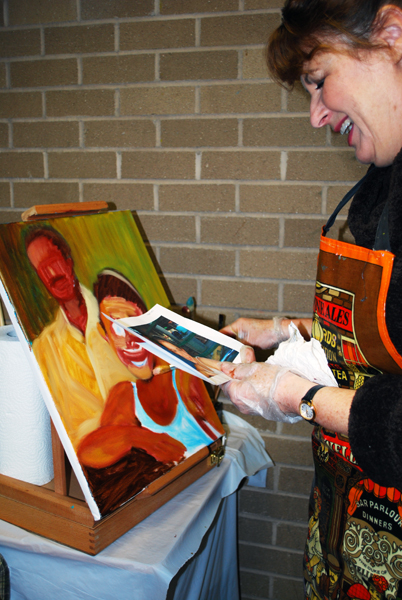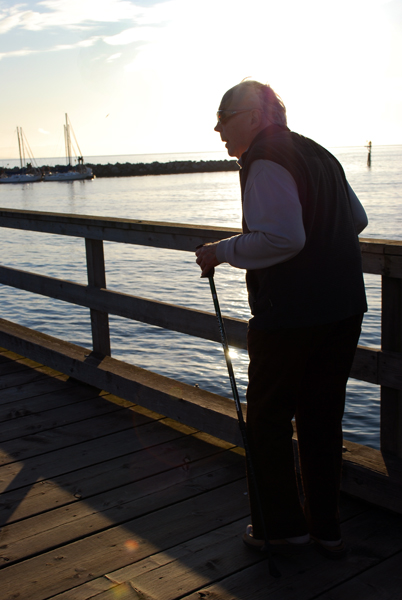Ending an obsessive relationship is all about finding balance
November 7, 2010 by Amanda Punshon · Leave a Comment
by Meagan Gill and Amanda Punshon
Boundaries make everything better — especially when it comes to relationships. Obsessive relationships are characterized by a lack of respect for healthy boundaries in one or both partners’ lives, according to Robyn Rushford, a Kwantlen counsellor, and Rob Hadley, a hypnotherapist with Vancouver Hypnotherapy.
Rushford explains obsessive relationships as being “like an addiction. So when we think in terms of addiction language, does the addiction have control over you? Are you doing things in your life because of the addiction that you would not normally be doing? So one of the questions you would want to ask is, is the relationship good for you or bad for you?”
These relationships often fall into one of two categories: where only one of the partners is addicted, or where both partners are.
When one partner is addicted:
When we think of obsessive relationships, we often think of stereotypes from the movies: stalkers, controlling husbands or nerds who are convinced the most popular girl in school is in love with them.
According to Rushford, it’s true that addictive relationships aren’t always relationships in the conventional sense. Sometimes they are relationships that have ended, and sometimes they never even began. But it’s not unheard of for one partner in a functioning relationship to become obsessed, as in the case of the controlling husband.
Rob Hadley, a hypnotherapist with Vancouver Hypnotherapy, says that social media has made it even easier for people to feed their relationship addictions. “Someone who is very obsessed with a partner, or an ex-partner, they can suck up hours and hours of their time and we’ll be asked, ‘How do I get over this?’”
“Often people in your life will comment that they see things in the relationship that don’t seem to be healthy for a person,” Rushford says. “So that could be spending an awful lot of time fantasizing, thinking about the relationship, pursuing a person. And I think now, with social media, that we see that quite frequently. It could be using Facebook in a way, almost like stalking kind of behaviour. Of texting people persistently, calling people.”
Social media stalking can also be translated into the real world. Rushford says it’s not uncommon for addicted people to engage in behaviour such as “following people, of planning their life around somebody to the degree that could include maybe picking your courses because you know that person is going to be in the courses. Planning your route based on what that person’s schedule is going to be like. So that person becomes the focus of everything in your life.”
Being the target of an obsession, especially if you’re in a relationship with the person, can have negative effects. Hadley says that the loss of self-esteem is common in people who have been the subject of an obsession.
To combat that, Rushford says the most important thing you can do is establish clear boundaries: maintain your own circle of friends; do things on your own; emphasize the importance of your needs.
“I think that would be a really challenging relationship to have,” she says. “And I don’t know how well they work out.”
When both partners are addicted:
Sometimes it’s not just one partner who is addicted. At the beginning of a relationship, Rushford says, it’s natural for the couple to become infatuated with each other to the exclusion of the rest of the world. It’s all about the degree of the infatuation — how long has it lasted? are grades or jobs or family responsibilities suffering?
Usually, she says, the couple will rejoin the world eventually. But if they don’t, you’re left with two people who are okay with their relationship, even if it’s “not necessarily healthy. Not all relationships are healthy.”
If you’re not okay with the intensity of your relationship, Rushford says the first thing you should do is take time to re-evaluate your goals and your life. If school is your priority and you’re not able to focus on it, you might need to step back from the relationship.
On the other hand, if you have a friend or a family member who’s in a relationship like that, it’s important to give them space, she says. All you can do is “be there for your friend, to say, ‘Hey, I care about you.’ And to have your own boundaries as well…What’s okay with you? Is it okay that your friend disappears for four months and then knocks on your door one day? I don’t know what the answer to that is. It would be all about what works for you.”
“In an ideal world, I guess you’d hope to be able to maintain some kind of a relationship but respect that there’s a change that’s happened. You might not have as high a place in their life now but, ideally, too, if you can make time for your friends, you’re going to be better off.”
In either situation:
In both Hadley and Rushford’s view, becoming addicted to a relationship and being attracted to addictive personalities come from the same place.
For Hadley, people “learn our relationship behaviours often from our parents. If you look at someone who’s had a bit of trouble in relationships, when you look at how his or her parents manage their relationships, often what you will find is that they’ve had some trouble managing relationships as well.”
He views early childhood as the formative time in a person’s life. If something traumatic happened to a child, it will affect adult relationships.
Hadley also says that trust is paramount in relationships. “What it comes down to is how much one partner trusts the other to just do their own thing and to be where they say they’re gonna be,” he says. “So if you’re looking at early signs that it may not be going right, look at the levels of trust.”
Rushford takes a different view. She works from an attachment theory base, which means that she feels “that obsessiveness in relationships is often about the anxiety of being rejected or of being abandoned, and it becomes so rooted in your experience that you do everything to maintain this attachment.”
Both the addicted person and their partner may have this anxiety, and wounded people are often drawn to wounded people.
“It’s about filling a void that is in yourself, and I think at the end of the day, that’s probably what we need to focus on,” she says. “What is that void, that place you feel the relationship is going to fill in you? And often, I think it is an attachment wound, something that didn’t go well in your development with the attachment figures in your life. Abandonment, rejection, those kind of things.”
What to do:
If you find yourself in an addictive relationship, there are a few easy ways to break its grip on your life.
First, be willing to talk about it. Rushford says that “when you can bring something out in the open, when you can start to talk about it that’s the very beginning of something losing its power.”
Second, make your lifestyle as healthy as possible. Both Rushford and Hadley say that when your lifestyle is balanced and healthy, it makes it easier for you to cope with the stresses in your life. “We will get them exercising, improve their diet, get them sleeping better, give them some general anxiety tools, so they’re not weakened by the experience of the relationship. So they are in their best shape to deal with the post-relationship landscape,” says Hadley.
Vancouver Hypnotherapy uses a three-aspect approach to assess a person’s risk factors: how stable is their work/security situation? What do their home, family and relationships look like? How do they look after themselves emotionally and physically? If the relationship is healthy, all of those factors will be in balance, Hadley says.
Rushford uses different language, but she says basically the same thing: balance is important. When one part of your life falls out of orbit, it makes it harder to keep the rest on track. Also important, she says, is building a tolerance to the anxiety associated with your addiction. Saying no gets easier every time.
Third, seek help. Psychotherapy and hypnotherapy take different approaches to dealing with addictive relationships. It’s up to you to decide which best fits your situation.
The main difference between hypnotherapy and psychotherapy is that, in psychotherapy, a counsellor will discuss your issues with you, attempt to find their source and help you fix them. But they won’t push you in a specific direction. In hypnotherapy, on the other hand, the therapist will discuss your issues, but they will also tell you to end the relationship if it continues to be unhealthy. It’s important to note that in both approaches, the therapy will be conducted differently by each individual therapist.
Further reading:
Kwantlen Counselling has two leaflets that might be helpful. One’s called Addictive Relationships, the other Committed Relationships and School.
Also available in the counselling office or at your local library are these books:
- Obsessive Love: When it hurts too much to let go by Susan Forward, PhD, and Craig Buck.
- Boundaries and relationships: knowing, protecting and enjoying the self by Charles K. Whitfield, M.D.
- Loving him without losing you: how to stop disappearing and start being yourself by Beverly Engel.
Kwantlen instructor’s book explores ‘mythology’ of addiction
December 8, 2009 by Abby Wiseman · 1 Comment

Kwantlen instructor Ross Laird is releasing his third book in the new year. (Abby Wiseman photo)
Kwantlen professor Ross Laird will have his third book published, in the new year.
The book, yet to be titled, focuses on addiction.
Instead of taking the common clinical view on addictions, Laird looks at the subconscious stories that addicts tell themselves, calling it “mythological intervention.â€
After 20 years of working with addicts on the downtown eastside, Laird noticed that the path to addiction and recovery, is similar to many mythological stories about struggling with demons and coming to a place of enlightenment.
Laird believes by changing the stories, or the myths, that addicts and society have about the nature of addiction, then those struggling with addiction can be better served.
“Addicts have all kinds of beliefs about themselves, conscious and otherwise, and society has all kinds of beliefs about addicts, too. In a way, addicts have become the projected shadow of society,†said Laird.
Laird was shortlisted for the 2001 Governor General award for his first book, Grain of Truth, which was about the mythology surrounding woodcarving.
He started working with the creative writing department at Kwantlen and is now in the process of creating an expressive arts program.
GBTR Successful Aging Festival full of life
December 1, 2009 by Kristi Jut · 2 Comments

Robin Bandenieks wanted to lure community seniors to art as a form of recreational therapy at the Successful Aging Festival on Kwantlen's Langley Campus, Friday Nov. 27. (Kristi Jut photo)
Afternoon naps and tea parties for senior citizens in Langley? Not likely.
Kwantlen’s Gerontology-based Therapeutic Recreation students put together a lively Successful Aging Festival on the Langley campus on Friday, Nov. 27.
The 20 students graduating from the program this year had to plan an event as part of their course requirements. Instructor Carol Hansen said she was extremely pleased with the outcome of event, which the students have been planning since September. The money raised from raffle tickets and donations will go toward community activities for seniors.
GBTR student Jenni Scott said students in the program had sent out posters and flyers to homes and throughout the community to promote the Successful Aging Festival.
The festival, which included over 30 kiosks that supported senior recreation, as well as a tarot-card reader and door prizes, lured many senior citizens from Langley and surrounding communities.
“It’s important to spread awareness to the community about senior-recreation,†said soon-to-be graduating student Aubrey Morrison. “Not a lot of people know that there are activity groups or outreach programs available.â€
Robin Bandenieks from the Fort Langley Artists group was there to promote an active interest in the arts to the aging community.
“I’m here to hopefully talk someone into taking up painting as a hobby,†said Bandenieks. “[Painting] can improve cognitive skills in older people,†she said, also noting that it keeps the brain active and is a defense against the effects of Alzheimer’s disease, which is common among the elderly.

Students anticipating graduation from GBTR program organized the entire festival, including games, raffles, kiosks and door-prizes. (Kristi Jut photo)
Volunteer Parish nurse and senior citizen Agnes Bauer from the Ladner United Church was also there to promote workshops and activities for the community. “We run a disabilities support group,†said Bauer, but wanted to inform that seniors need the same type of counseling that younger people do—including issues with sex and drugs.
“We just had a very successful HIV workshop,†she said. “Some seniors think AIDS and HIV is not an issue for them, but they’re mistaken if [they] think they’re getting out of this life without knowing someone with HIV or AIDS.†Bauer also made a point of speaking on the church’s addictions program, which ranges from addictions to shopping, sex, and, of course, drugs.
Langley Seniors Centre leaders Donna Benoit and Arlene Brown had a lot to offer the senior’s community, with an extensive outreach program for lonely or dependant seniors and an adult day centre to provide relief for caregivers. The centre has worked closely with Kwantlen, they said, and has helped inform people about their programs.
Brown emphasized that awareness about the programs have become increasingly important. “However old you are now,†she said, “you’re going to be a senior one day.â€
The campus was free of paid-parking for the day of the event.

A White Rock senior takes advantage of the late-November sunny day by keeping active. (Kristi Jut photo)



